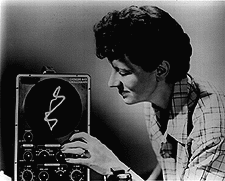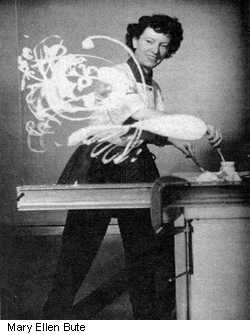Mary Ellen Bute
(1906-1983)
CVM's Bute Research Pages : About Finnegans Wake


Bute's rarely-screened feature film, Passages from Finnegan's Wake. 1965-67, 92 mins, 16mm, b/w. Screened at our 2006 Bute Centennial Program, Los Angeles.
Harvard Film Archive Program Notes: "Mary Ellen Bute, a true poet of cinema, created a joyously Joycean, fascinating, and imaginative film, a mixture of the aural—for Joyce’s words are not only spoken but seen in subtitles—and the visual. A delight to critics, Joyceans, and lovers of film, Passages from Finnegans Wake suggested a new orientation for students of Joyce as well as for cineastes. Time magazine wrote that “its dream sequences . . . featuring reverse footage, collages and montages . . . frequently are as challenging and witty as Joyce’s prose.”
Review by Leonard Maltin: Finnegan's Wake (1965) 97 m ***1/2 D: Mary Ellen Bute. Stars: Page Johnson, Martin J Kelly, Jane Reilly, Peter Haskell. James Joyce's classic story of Irish tavern-keeper who dreams of attending his own wake is brought to the screen with great energy and control.
New York Times Review: "Finnegan's Wake was the first attempt to cinematize the works of Irish author James Joyce. Based more on a stage adaptation by Mary Manning than the Joyce novel itself, the film concentrates on Dublin pubkeeper Finnegan (Martin J. Kelly), who while in the throes of inebriation has a vision of his own death. As the bemused Finnegan lies in his coffin, his friends gather for his wake. The "corpse" tries to cut through the keening and platitudes by probing the innermost thoughts of those closest to him. The surprising aspect of Finnegan's Wake is that so much of its difficult text works on screen--a tribute to the loving care of scripter/director/editor Mary Ellen Bute, who while preparing this film spent her waking hours picking the brains and burrowing through the resource materials of the James Joyce Society." ~ Hal Erickson, All Movie Guide
"Passages is a trove of superimpositions, flashbacks, varied angles, slow motion, intercutting, rapid motion, stop action, negative images, documentary footage, and finally sub-titles ... It brings in television, the H-bomb, the twist, interplanetary rockets. Bute believed that Joyce would have accepted the modern elements in a film based on his 1939 novel, and she even quoted a line from Finnegans Wake that mentions television." Lillian Schiff, "The Education of Mary Ellen Bute" in Film Library Quarterly 17:2 (1984). Rpt., abr. in Women and Animation: A Compendium. Ed. Jayne Pilling. London: British Film Institute, 1992.
NOTE: An interview with Mary Ellen Bute about Finnegans Wake, including clips from the film, is available through the CVM Store here.
Contact us: CVM
Subscribe to our mailing list - email us: list at centerforvisualmusic.org